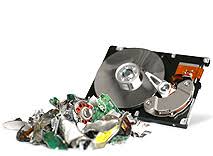Secure Device Disposal
The hard drive of your computer, printers, and mobile drives contain all kinds of potentially sensitive information, including old email messages, class rosters with grades, research information, and possibly personal information such as credit card numbers, health information, or even your Social Security number. There are serious risks to the University and you if this information falls into the hands of an unethical person. In addition to the damage such a loss could hold for the reputation of the University and you personally, there is the possibility of a lawsuit from an employee, student, patient, or other individual who might be harmed by the unnecessary exposure of private data.
For these reasons, it is imperative that all types of hard drives (permanent, removable, and portable) and printers be disposed of safely. You will find a wealth of ‘home remedy’ type advice on the internet, but the only approved method for disposing of a hard drive on a University owned machine: shredding. Printers/copiers should have the storage media removed and shredded.
Safe disposal isn’t just a recommendation. It’s policy. The Information Security Control Standards require that hard disks, magnetic tapes, compact disks, video tapes, audio tapes, and removable storage such as USB flash drives that store sensitive information be disposed of securely disposed.
The Surplus Property Warehouse provides shredding services for hard drives and tape drives. If visual verification of shredding is required, contact the Surplus Property Warehouse at 919-962-2134 for an appointment. The shredding fee is $3.00 per hard drive, charged to your department account. Other disposal companies can be utilized to remove any media that you wish to have destroyed, please consult with the Information Security Office with questions.
If you want to reuse a hard drive, there are multiple software applications that will assist you wipe out any existing data first. Just understand that deleting a file isn’t enough nor is re-formatting the drive. LifeWire offers a simple tutorial on how to get the job done so that a data recovery program won’t find any remnants of your data.
Don’t forget to safely dispose of your paper too. It’s easy in this computer-centric world to forget that some papers still needs to be shredded for safe disposal. Facilities Services offers confidential paper recycling here on campus.